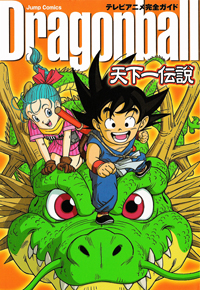Translations Archive
TV Anime Guide: Dragon Ball Tenka’ichi Densetsu

Majin Boo…as voiced by…Kōzō Shioya
He’s so outrageous, yet he’s a character you can’t hate. (Shioya)
What led to your appearing in Dragon Ball Z?
I’d already appeared as guest-characters up until then. Gurd of the Ginyu Special-Squad, for instance. Then one day, I was told “we’d like you to do this role next,” and that was Majin Boo. I was already acquainted with the recording staff, so instead of an audition, it was more like I was given the role as an extension of my regular work. I knew that the original manga was a popular work, but it wasn’t like I was reading it zealously, so I looked over it again.
When you created the role, how did you try to play Boo?
In terms of feeling, I thought of him in the manner of a self-centered three-year-old. Rather than directions from the staff, I kept an approach based on the mood given off by the character; I was able to perform surprisingly smoothly.
It was a character with a large number of forms, who would absorb a variety of characters and change shape.
I think that even for the slim Boo, who is the exact opposite of the fat Boo, his personality from when he was fat is still the foundation, so I went to a lot of trouble not to deviate from that, yet to also give off a feeling that his form had changed. So even while I was performing, I was always keeping the voice of Boo’s fat form in my mind, wondering “is this all right?” In that sense, I suppose maybe he was a character who took some subtlety to play.
His entanglement with Mr. Satan was fun, too.
It was. They’re both funnymen, so it was like a comedy duo with two funnymen and no straight man. (laughs) Their relationship, going together with the wrong idea of each other, was enjoyable. Performing with Daisuke Gōri-san, who played Mr. Satan, was fun as well.
Are there any scenes with Boo that left an impression on you?
The episode where Boo starts living by himself. He had a lot of fights, so that part especially left an impression.
Were there any parts where you exercised some creativity, such as with the battle cries?
For battle cries and such, I’d try a bunch of changes while watching the images. If I used the same shouts all the time, it’d be unpleasant for me as a performer, and the people watching would probably tire of it. Boo is a character who especially laughs a lot, so instead, I thought it would be interesting if he used the same laugh no matter the situation, so I kept the tone of that the same when I played him.
Are there any scenes or episodes from the show that left an impression?
It’s not about Majin Boo, but around the beginning of Dragon Ball Z, I played the role of a robot. In that episode, the only two characters were Gohan and the robot, so that left an incredible impression on me. Since he was a robot, I had to play him with an emotionless voice, but no matter what, I’d end up wanting to bring out emotions in response to Masako Nozawa-san’s lines as Gohan (laughs), and I remember it being difficult to hold back.
From the perspective of a performer, where do you think the interest of the Dragon Ball series lies?
The appeal of Toriyama-sensei’s art is probably a big part of it. And also, the characters and the ease of understanding the story. I suppose it’s what you’d call an orthodox work. I suppose that’s probably the power of the work.
What were some good things about appearing in the series?
When I went into the studio, it was nothing but major voice actors, so I felt an incredible sense of relief. Normally, when you have so many senior figures, you might suppose they’d go out of their way, but they would just get right down to performing, so in that respect, you’d be able to concentrate on your role. It really is an honor having worked alongside people who had been active [in the industry] since so long ago.
Finally, a message!
I’ll be playing Boo in games and such from here on out, so when the time comes, please [give me your support].
(Recorded 17 May 2004)
English Translation: Julian